PREVIOUS
Bharat Ratna and 2024 winners
(இதன் தமிழ் வடிவத்திற்கு இங்கே சொடுக்கவும்)
Introduction to Bharat Ratna:
- It was established in 1954 as India's highest civilian award.
- Its eligibility extends to individuals regardless of race, occupation, or gender.
- Recipient receives a Sanad (certificate) signed by the President and a medallion.

Criteria and Selection:
- It is awarded for outstanding service or performance in any field.
- Prime Minister recommends directly to the President so no formal recommendations are needed.
- It is limited to a maximum of three awards annually.
Exceptional Recognition:
- Primarily it is awarded to India-born individuals.
- Exceptions include Mother Teresa, Khan Abdul Ghaffar Khan, and Nelson Mandela.
Amendments and Posthumous Awards:
- Originally it disallowed posthumous awards but it was amended in 1955.
- Lal Bahadur Shastri was the first posthumous recipient.
Exceptions and Recent Instances:
- The guideline for the Bharat Ratna, initially limiting recipients to three per year, was first exceeded in 1999.
- At that time, it was honouring Jayaprakash Narayan, Amartya Sen, Gopinath Bordoloi, and Ravi Shankar.
- In 2024, the rule was again surpassed, with five recipients being conferred the award.
2024 awardees:
- Prime Minister Narendra Modi announced Mankombu Sambasivan Swaminathan, Pamulaparthi Venkata Narasimha Rao, Chaudhary Charan Singh, Karpoori Thakur, Lal Krishna Advani as recipients.
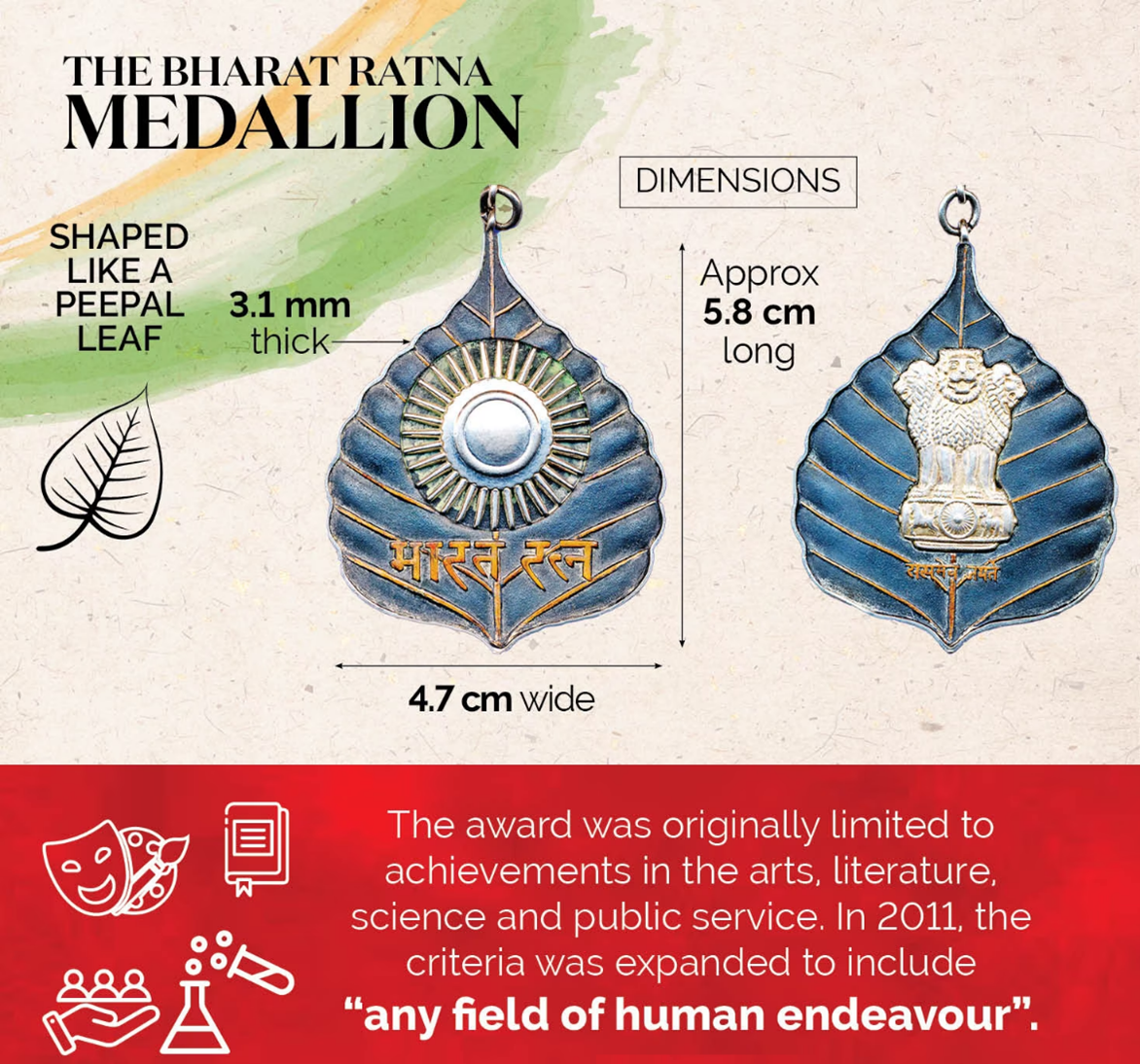
Mankombu Sambasivan Swaminathan
- Dr. M S Swaminathan is the “Father of the Green Revolution in India”.
- He is an agricultural scientist and agronomist.
- Green Revolution: A period of agricultural transformation in the mid-1960s, adopting high-yield crop varieties.
- MS Swaminathan's Role: Instrumental in leading India's Green Revolution.
- Development of High-Yield Varieties: Collaborated with Dr. Norman Borlaug to develop wheat varieties for increased grain yield.
- Farmer Adoption: Established demonstration plots to show farmers the benefits of new grain varieties.
- Impact: India's wheat production doubled, reducing the need for grain imports.
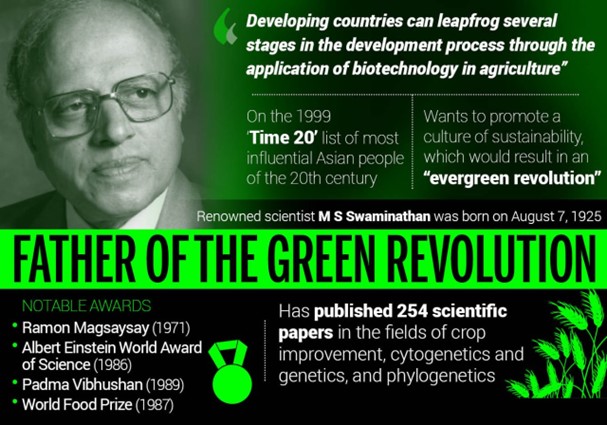
Ensuring Food Security and Farmer Welfare
- Food Security Advocacy: MS Swaminathan aimed beyond increasing crop yields to ensure food security for India.
- He advocated for an effective public distribution system to provide food grains to poor consumers and alleviate hunger.
- He transformed India from a drought-stricken nation reliant on US imports in the 1960s to being self-sufficient in food by 1971.
- He was recognized with the World Food Prize in 1987 for contributions to agricultural science and food security, establishing the MS Swaminathan Research Foundation (MSSRF) with the prize proceeds.
National Commission on Farmers
- As the commission's chairman, Swaminathan issued reports recommending minimum crop support prices, faster inclusive growth, and policies to address farmer suicides.
- He was Instrumental in developing the Protection of Plant Varieties and Farmers' Rights Act of 2001 to safeguard farmers' interests.
|
Awards and Recognition |
Details |
|
Honorary Doctorates |
Received over 80 honorary doctorates from universities worldwide. |
|
Member of Parliament |
Served in the Rajya Sabha from 2007 to 2013. |
|
International Awards |
Ramon Magsaysay Award for Community Leadership, 1971 Albert Einstein World Science Award, 1986 World Food Prize, 1987 UNEP Sasakawa Environment Prize, 1994 Franklin D Roosevelt Four Freedoms Medal, 2000 Mahatma Gandhi Prize of UNESCO, 2000 |
|
National Awards |
S.S. Bhatnagar Award,1961 Padma Shri, 1967 Padma Bhushan, 1972 Padma Vibhushan, 1989 Indira Gandhi Prize for Peace, Disarmament, and Development, 2000 Lal Bahadur Shastri National Award, 2007 |
Pamulaparthi Venkata Narasimha Rao
Early Life and Career:
- He was born on June 28, 1921, in the former Nizam's Hyderabad state.
- He engaged in freedom fighting, academics, and literature.
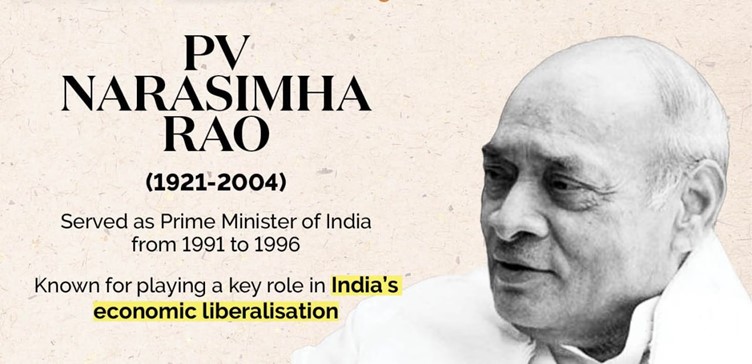
Prime Ministership and Literary Contributions:
- He served as India's 9th Prime Minister from 1991 to 1996.
- He published 'SahasraPhan,' a Hindi translation of the renowned Telugu novel 'Veyi Padagalu.'
Economic Reforms:
- He aimed to dismantle the license raj's restrictions and reduce bureaucratic hurdles to enhance Indian industries' competitiveness.
- He initiated economic liberalization, orienting policies towards the market and fostering private and foreign investment.
Foreign Policy Initiatives:
- He established diplomatic relations with Israel.
- He introduced India's Look East Policy.
- He enhanced relations with the United States, reversing decades of strained ties.
Constitutional Amendments:
- He oversaw the enactment of the 73rd and 74th Constitutional Amendments Act, empowering local bodies.
Chaudhary Charan Singh
Early Life and Political Career:
- He born in 1902 into a middle-class farming family in Meerut.
- He started his political journey with the Congress party, holding various ministerial positions.
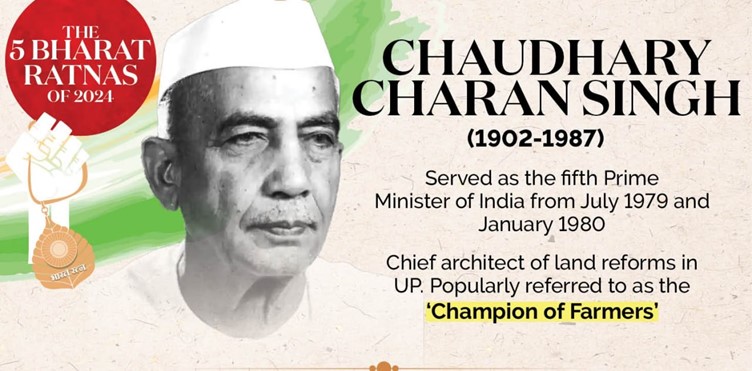
Leadership Roles:
- He became the Chief Minister of Uttar Pradesh in 1967.
- He briefly served as Prime Minister in 1979 before resigning amidst political turbulence.
Contributions and Legacy:
- A pivotal figure in the Janata Party, he was known for his writings on land reforms and agricultural policies.
- He renowned for spearheading crucial legislative initiatives aimed at agricultural reform, including significant land reform bills.
Karpoori Thakur
Early Life and Political Mentorship:
- Known as "Jan Nayak," he served as Bihar's 11th Chief Minister twice.
- A freedom fighter and staunch socialist mentored by leaders like Jayaprakash Narain, Dr. Rammanohar Lohia, and Ram Nandan Mishra.
- He represented the Nai community, an Extremely Backward Class (EBC) among OBCs, entering politics in 1952 and serving as a legislator until 1985.
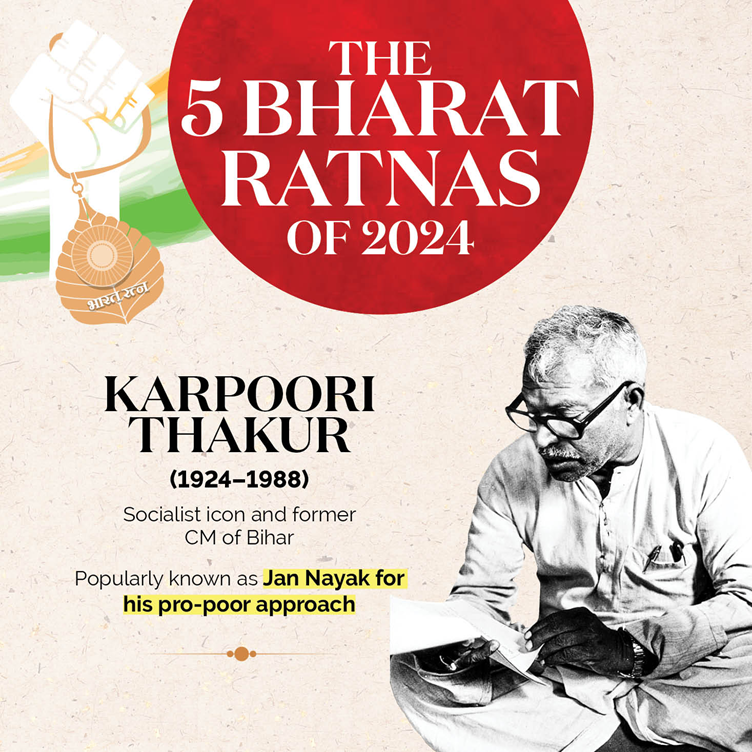
Chief Ministerial Term and Reservation Policy:
- During his 1977 tenure, the Mungeri Lal Commission recommended reclassifying backward classes, including weaker sections of Muslims.
- It introduced a pioneering reservation model in 1978.
- It was allocating 26% reservations with specific quotas for OBCs, EBCs, women, and economically backward classes among upper castes.
- It preceded the Mandal Commission report advocating for 27% reservations for Other Backward Classes.
Policy Implementations:
- He promoted Hindi and Urdu as the second official language.
- He waived school fees and strengthened Panchayati Raj.
Lal Krishna Advani
- Birth: He was born in Karachi on November 8, 1927, during pre-Partition India.
- Early Affiliation: He associated with the Rashtriya Swayamsevak Sangh (RSS) and the Bharatiya Jana Sangh.
- Entry into Politics: He joined politics through RSS and became a member of Bharatiya Jana Sangh in 1951.
- Rajya Sabha Membership: He elected to the Rajya Sabha in 1970, starting significant political involvement.
- Co-founder of BJP: He co-founded the Bharatiya Janata Party (BJP) in 1980.
- Deputy Prime Minister: He served as India’s Deputy Prime Minister from 2002 to 2004.
- Contributions: He contributed to economic reforms, infrastructure development, and India's nuclear tests of 1998.
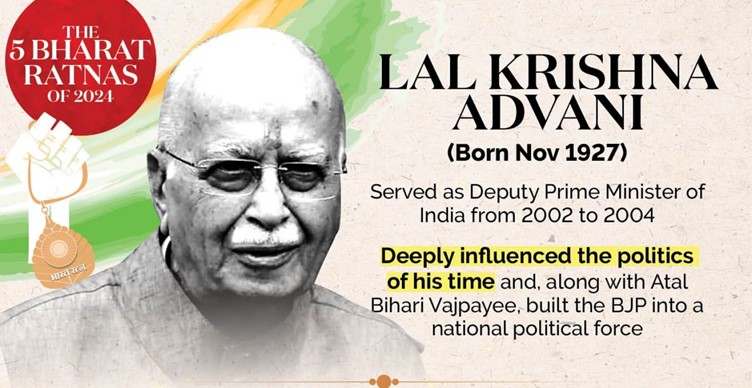
List of Bharat Ratna awardees till date
|
Serial No. |
Recipient |
Year |
|
1 |
Chakravarti Rajagopalachari |
1954 |
|
2 |
Sarvepalli Radhakrishnan |
1954 |
|
3 |
Chandrasekhara Venkata Raman |
1954 |
|
4 |
Bhagwan Das |
1955 |
|
5 |
Mokshagundam Visvesvaraya |
1955 |
|
6 |
Jawaharlal Nehru |
1955 |
|
7 |
Govind Ballabh Pant |
1957 |
|
8 |
Dhondo Keshav Karve |
1958 |
|
9 |
Bidhan Chandra Roy |
1961 |
|
10 |
Purushottam Das Tandon |
1961 |
|
11 |
Rajendra Prasad |
1962 |
|
12 |
Zakir Husain |
1963 |
|
13 |
Pandurang Vaman Kane |
1963 |
|
14 |
Lal Bahadur Shastri |
1966 |
|
15 |
Indira Gandhi |
1971 |
|
16 |
Varahagiri Venkata Giri |
1975 |
|
17 |
Kumaraswamy Kamraj |
1976 |
|
18 |
Mother Mary Teresa Bojaxhiu (Mother Teresa) |
1980 |
|
19 |
Vinoba Bhave |
1983 |
|
20 |
Khan Abdul Ghaffar Khan |
1987 |
|
21 |
Marudur Gopalan Ramachandran |
1988 |
|
22 |
Bhim Rao Ramji Ambedkar |
1990 |
|
23 |
Nelson Rolihlahla Mandela |
1990 |
|
24 |
Rajiv Gandhi |
1991 |
|
25 |
Sardar Vallabhbhai Patel |
1991 |
|
26 |
Morarji Ranchhodji Desai |
1991 |
|
27 |
Maulana Abul Kalam Azad |
1992 |
|
28 |
Jehangir Ratanji Dadabhai Tata |
1992 |
|
29 |
Satyajit Ray |
1992 |
|
30 |
Gulzari Lal Nanda |
1997 |
|
31 |
Aruna Asaf Ali |
1997 |
|
32 |
A.P.J. Abdul Kalam |
1997 |
|
33 |
Madurai Shanmukhavadivu Subbulakshmi |
1998 |
|
34 |
Chidambaram Subramaniam |
1998 |
|
35 |
Jayaprakash Narayan |
1999 |
|
36 |
Amartya Sen |
1999 |
|
37 |
Lokpriya Gopinath Bordoloi |
1999 |
|
38 |
Ravi Shankar |
1999 |
|
39 |
Lata Dinanath Mangeshkar |
2001 |
|
40 |
Ustad Bismillah Khan |
2001 |
|
41 |
Bhimsen Gururaj Joshi |
2009 |
|
42 |
C. N. R. Rao |
2014 |
|
43 |
Sachin Ramesh Tendulkar |
2014 |
|
44 |
Atal Bihari Vajpayee |
2015 |
|
45 |
Madan Mohan Malaviya |
2015 |
|
46 |
Nanaji Deshmukh |
2019 |
|
47 |
Bhupendra Kumar Hazarika |
2019 |
|
48 |
Pranab Mukherjee |
2019 |
|
49 |
Karpoori Thakur |
2024 |
|
50 |
Lal Krishna Advani |
2024 |
|
51 |
Pamulaparthi Venkata Narasimha Rao |
2024 |
|
52 |
Chaudhary Charan Singh |
2024 |
|
53 |
Mankombu Sambasivan Swaminathan |
2024 |
-------------------------------------


